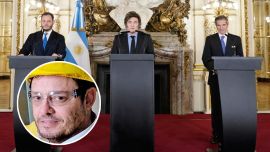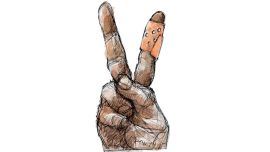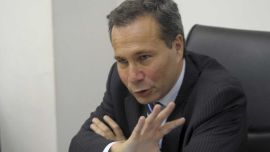For all the bad blood between their leaders, Brazil and Argentina are starting a diplomatic dance to discuss trade and political issues that the region's two largest economies just can’t put off for too long.
Brazilian President Jair Bolsonaro on Wednesday hosts Foreign Minister Felipe Solá, who will also meet his counterpart Ernesto Araujo. They will discuss bilateral trade, the Mercosur trade union and Venezuela, according to four officials with direct knowledge of the schedule who are not authorised to discuss the matter publicly.
Argentina is also seeking political backing for debt negotiations with the International Monetary Fund, two of the people said.
Relations between the two key trade partners worsened late last year as Bolsonaro’s far-right administration clashed with Alberto Fernández’s left-leaning government. The leaders have traded insults and the Brazilian president refused to attend the Frente de Todos leader's inauguration. While tensions remain, Solá’s visit to Brasilia is part of a push to find common ground. The conversations could even pave the way for a future encounter between the two presidents.
A deep point of contention is Mercosur, the trade bloc consisting of Brazil, Argentina, Uruguay and Paraguay. While Bolsonaro has called for a swift implementation of the trade deal struck between the South American bloc and the European Union, Fernandez has signalled he is in no rush to enact the accord and even wants to change some of its terms.
More than neighbours
Under pro-market Economy Minister Paulo Guedes, Brazil is seeking to open its economy as aggressively as possible to free trade. On the other hand, Fernández intends to maintain protectionist measures in areas where Argentina isn’t competitive, according to an Argentine official who asked not to be named.
Despite political differences, the economies of Brazil and Argentina remain deeply intertwined. Annual trade between them consisting of goods as diverse as agricultural goods, shoes and automobiles totalled some US$20 billion in 2019, according to Argentine data.
Argentina’s recession shaved roughly 0.2 percentage points from Brazil’s economic growth last year, according to Brazil’s central bank. While the Brazilian economy is expected to accelerate in 2020 to an expansion of about two percent, Argentina is forecast to shrink some 1.3 percent in its third consecutive year of recession, IMF estimates show.
“Brazil and Argentina share more than a long border: both economies are exposed to commodities cycle, have low domestic savings and have had, over history, a tendency to overindulge in fiscal and monetary stimulus as a strategy to boost growth, rather than seeking productivity gains through reforms," said Adriana Dupita, Latin America economist for Bloomberg Economics.
For both countries’ leaders, moving beyond past tension may be no easy task. Bolsonaro has said Argentines made a bad choice by electing Fernández, who called the Brazilian president a racist and misogynist.
Still, weak growth means there’s no getting around the fact they will have to put aside their differences to help their countries, according to Newton Rosa, chief economist at Sul America Investimentos Dtvm.
“While the presidents have very different approaches, at some point they will have to meet and work together,” said Rosa. “Both economies will benefit from this.”
related news
by Samy Adghirni & Jorgelina do Rosario, Bloomberg
























Comments